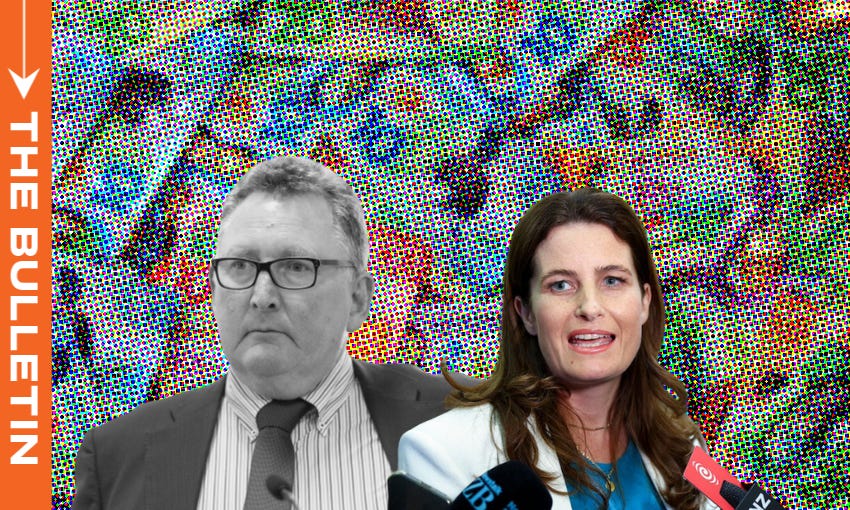Mōrena, and welcome to The Bulletin for Thursday, November 28.
In today’s edition: Covid inquiry chair admits vaccine mandates eroded trust, Labour Party members will consider a rule change that would stop party leaders from making “captain’s calls”, and why Christopher Luxon would be comfortable living next to a new radioactive waste facility. But first, the good and the bad from the Reserve Bank’s latest cash rate decision.
Cash rate cut
As widely predicted, the Reserve Bank confirmed yesterday that it will reduce the official cash rate by 50-basis points down to 4.25%. It’s the third consecutive drop in the OCR, and the second time in a row that it’s been slashed by 50 points. In response, reported 1News, several major banks immediately cut their loan rates in what will be welcome pre-Christmas relief for homeowners. It takes the cash rate down to its lowest level since November 2022, which was after the economic hit of the Covid-19 lockdowns and right in the midst of the cost of living crisis. The government was quick to celebrate the news, reported RNZ’s Gyles Beckford, with finance minister Nicola Willis claiming the positive economic update was a consequence of sound fiscal management over the first 12 months of this parliamentary term. “We are headed in the right direction,” she said.
But while there might be an instant sugar hit for mortgage holders, the Reserve Bank warned that “the thrill might not be as big as what it looks like”. In analysis for the Herald (paywalled), Jenée Tibshraeny explained that factors other than the OCR can impact interest rates and geopolitical issues – including the outcome of the US election – were putting upward pressure on the market.
‘We remain cautious’
As such, all eyes are on the road as yet untravelled. The Reserve Bank said that if the economy continued to track as expected, it would be in a position to make further cash rate cuts in the new year, reported The Post’s Tom Pullar-Strecker. And while its forecasts were in line with another 50-basis point reduction come February, it was now predicting the economy will grow only 2% in the year to March 2026 and 2.4% the following year. Kiwibank’s chief economist Jared Kerr was among those casting doubt on whether the Reserve Bank would make further 50 basis point cuts. “We remain cautious. Because we believe rates needs to be cut lower than the RBNZ's 2025 forecast track to stimulate an economy struggling to get out of recession. And the real time data is still mixed at best.”
Later this morning, Reserve Bank leaders will appear before parliament’s Finance and Expenditure Committee to face scrutiny from MPs.
Word of the day: volatility
As noted above, the government has quickly claimed credit for the latest announcement. But it may not be so fast to celebrate should the wider outlook not improve. Writing for The Post, Luke Malpass noted that poor productivity remained the biggest drag on growth, though this isn’t just a localised issue. “But it is clear that when it come to both economic growth and inflation in the new year the watchword will be ‘volatility’,” wrote Malpass. In an interview with Thomas Manch to mark one year of the coalition government, deputy prime minister Winston Peters criticised National’s tax cut package for having “no material or beneficial effect in terms of growth in the economy”. Peters believed now was the time for prudent spending rather than further cuts, something we will likely have to wait until the next budget to hear about.
Writing for his Politik website, Richard Harman questioned whether a blowout in health spending coupled with a reduced tax intake could delay the government’s forecast return to surplus. Finance minister Nicola Willis has previously claimed the books would be back in shape by 2027-28, but Harman said this was now at risk. But: “As Luxon essentially claimed victory over inflation yesterday he didn’t sound like a prime minister preparing the ground for an austerity budget.”
Unemployment still rising
Meanwhile, the Reserve Bank also forecast that unemployment would continue to rise. The NBR’s Jonathan Mitchell reported (paywalled) that the central bank believed unemployment would peak at just over 5% early next year.
A new round of public sector cuts have been reported this week, with Te Whatu Ora said to be getting rid of almost 1,500 jobs, wrote Stephen Forbes for NZ Doctor (paywalled). That figure came from the Public Service Association, though about 700 of the roles were already vacant due to a recruitment freeze. The PSA said that the cuts include a net of 1,120 roles to be axed from the data and digital group and a net of 358 roles from the National Public Health Service. The health agency has disputed the figures, reported RNZ’s Lauren Crimp, saying the proposed net loss from the National Public Health Service was actually 57.
An open letter about the future of The Spinoff
This morning we have published an open letter from The Spinoff’s CEO Amber Easby, editor Madeleine Chapman and founder Duncan Grieve outlining the situation we find ourselves in. The letter toplines where we’re at right now as a platform – this paradoxical place where our audience is the strongest it has ever been, outside of events like Covid or elections – but that the stagnant ad market, and a hard drop in public funding for our work, has left us in a position where going public with a big, audacious goal is our last, best shot at retaining the ability to carry on doing what we do.
Please, if you are one of the hundreds of thousands of New Zealanders who regularly enjoy The Spinoff and want it to continue to be a part of the way Aotearoa understands itself, we are asking you to read it, share it, and, if you can, take action.
Listen to this special edition of The Fold where Duncan is joined by Madeleine, head of audience Anna Rawhiti-Connell and Amber to discuss the future of The Spinoff and make a very important announcement.
Covid inquiry chair admits vaccine mandates eroded trust
The first phase of the Royal Commission of Inquiry into the Covid-19 response will be given over to the government today, though it’s not yet known when the findings will be made public. In an interview with Stuff’s Lloyd Burr, inquiry chair Tony Blakely rejected claims he was a “patsy” for the previous Labour government, telling those who ascribe to that view they were in for a “huge surprise” when reading the report. “If you are another type of person who is thinking that it was all done wrong and any sense of collectivism was incorrect, and we should have a completely libertarian society where everybody does everything by themselves with no rules and stuff, you'll also be surprised and shocked at what we say.”
The inquiry looked at the impact of vaccine mandates and Blakely is fairly open when asked to comment. While most New Zealanders were supportive of the strict measures, it was “undeniable” that mandates eroded trust, Blakely said in comments reported by the Herald’s Isaac Davison. “And that is an incredibly important lesson out of the pandemic … When you’re doing those types of mandatory things, like mandatory vaccination, they really need to be in a context where the benefits far outweigh the harms.”
‘Captain’s calls’ could become a thing of Labour’s past
Labour Party members will consider a rule change that would stop party leaders from making “captain’s calls” on policies, reports the Herald’s Thomas Coughlan (paywalled). Previous examples of captain’s calls have included Jacinda Ardern ruling out a capital gains tax for her entire tenure, or more recently, but still involving tax, Chris Hipkins dumping a wealth tax proposal drawn up by his finance minister Grant Robertson. Party members will gather alongside MPs in Christchurch this week for Labour’s national conference where the proposed rule will be discussed. According to Coughlan’s report, it would mean the party’s manifesto can only be changed if the caucus and party policy council jointly agreed and if it was a “matter of great urgency”. Those on the policy council include caucus members and some elected officials, including former MP Michael Wood.
This weekend’s conference will also see members consider whether to reopen the tax debate and progress with a possible capital gains or wealth tax policy ahead of the 2026 election.
Meanwhile, Labour leader Chris Hipkins is continuing to reflect on last year’s election loss and think how he might be able to turn the ship around. As Stuff’s David Long reported, Hipkins is now making regular visits to Auckland – a region where the party made significant losses in 2023 compared with previous elections.
The Spinoff Live in Auckland: The Year in Review is on sale now
After a sold-out event in Wellington, Anna Rawhiti-Connell will take a running jump backward into the year’s biggest headlines, political dramas and Spinoff yarns in Auckland at Q Theatre on December 11. Anna will be joined onstage by special guests, rose-tinted glasses and Christmas cheer.
Click and Collect
In the second instalment of a three-part series for The Spinoff, Oliver Neas explores the dramatic conflict and behind-the-scenes dealmaking that shaped the Wellington Airport saga.
An incredible headline of the back of some typically excellent reporting from Michael Morrah: Christopher Luxon claims he’d be comfortable living next to new radioactive waste facility.
First new charter school launched amid criticism of “unfair” process.
Investigation and legal fees into potty-mouthed council CEO cost ratepayers $254,000.
Analysis of officials’ advice has found the majority of new laws and regulations introduced in the government’s first year have been affected by time constraints and a lack of evidence.
Shanti Mathias explains Motu Move, a long-awaited transformation of New Zealand’s public transport. Alex Casey visits Willowbank, Christchurch’s first zoo, and chats to co-director Mark Willis. In The Spinoff Books Confessional this week: Odessa Owens, senior tutor, Whitireia Graduate Diploma in Publishing. Food, drink, shiny things and being merry – Gabi Lardies has decided to enjoy her 34th Christmas.
That’s it for today. Thanks for reading and see you back here tomorrow morning.
Want to get in touch? Join the conversation in the Substack comments section below or via email at thebulletin@thespinoff.co.nz if you have any feedback on today’s top stories (or anything else in the news).
If you liked what you read today, share The Bulletin with friends, family and colleagues.


















1120 job cuts to an already stretched public health service means that more and more people will die from a failure to gain medical treatment they desperately need and thousand more will live a life of reduced mobility because they are shut out of orthopedic surgery unless they can stump up with the tens of thousands of dollars to go private. Lester Levy is the devil visited upon every person languishing on a waiting list. A consummate liar who looks down a TV camera to promise one thing and once it's turned off, delivering EXACTLY THE OPPOSITE
False economy
The day will come when our social services will need revamped because they do not meet the needs of our people. More money on repairing the disastrous decisions made to cut budgets of services already stretched to meet minimum needs. This is actually happening now but coalition govt as so focused on surplus that they can not see what's happening now and the future.